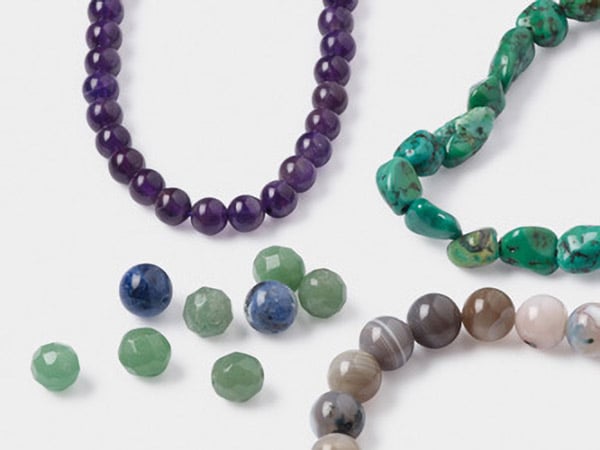Mohs Scale of Hardness
The Mohs hardness scale measures the relative hardness of gemstones, as determined by their scratch hardness (the resistance of a mineral when scratched with a pointed testing object.) The diamond is the hardest natural gemstone in the world and measures a ten on the hardness scale. Gemstones measured at a one can be easily scratched with a fingernail. To learn the hardness of many popular gemstone materials, see the chart below.
| Scale | Hardness | Material |
| 1 | Can be scratched easily with a fingernail | Sulfur: 1 - 1-1/2 |
| 2 | Can be scratched with fingernail |
Amber: 2 - 3
Ivory: 2 - 4 |
| 3 | Can be scratched with coin |
Pearl: 3 - 4
Coral: 3 - 4 Malachite: 3-1/2 - 4 |
| 4 | Can be scratched easily with a knife; cannot scratch glass | Rhodochrosite: 4 |
| 5 | Can be scratched with a knife; can just scratch glass |
Lapis Lazuli: 5 - 6
Turquoise: 5 - 6 Opal: 5-1/2 - 6-1/2 |
| 6 | Can be scratched with a steel file; easily scratches window/bottle glass |
Moonstone: 6 - 6 1/2
Tanzanite: 6-1/2 - 7 Peridot: 6-1/2 - 7 Zircon: 6-1/2 - 7-1/2 |
| 7 | Easily scratches metal, glass and softer stones |
Quartz, Citrine, and Amethyst: 7
Tourmaline: 7 - 7-1/2 Garnet: 7 - 7-1/2 Emerald: 7-1/2 - 8 |
| 8 | Scratches quartz and softer stones |
Topaz: 8
Alexandrite: 8-1/2 |
| 9 | Scratches topaz and softer stones |
Ruby: 9
Sapphire: 9 |
| 10 | Scratches ruby | Diamond: 10 |
How did you like this resource? Your feedback helps us provide resources that matter to you most.
Shop for Your Materials Here:
Copyright Permissions
All works of authorship (articles, videos, tutorials and other creative works) are from the Fire Mountain Gems and Beads® Collection, and permission to copy is granted for non-commercial educational purposes only. All other reproduction requires written permission. For more information, please email copyrightpermission@firemtn.com.
